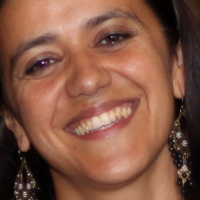PI: Verónica Policarpo
This is a non-funded project about the role that explores the importance of companion animals in the construction of LGBT lives and identities. Crossing contributions from the sociology of friendship, queer studies and animal studies, it explores the experiences of Portuguese self-declared gays, lesbians and bisexuals that live with one (or more) pet(s) at least for one year. Taking as reference their personal community, understood as the active and meaningful network of personal ties considered to be central in their lives, the project explores emergent and diverse forms of suffusion between humans and their companion animals (pets that are «like family» or «like friends»). Companion animals may be contributing to queering friendship in decisive ways, as they stand out as important sources of care, both in ordinary life, and in critical moments.
Team

Verónica Policarpo
PI (Principal Investigator)
sociologist and researcher at ICS-ULisboa, in the field of Human-Animal Studies. Since October 2018 she coordinates the project “CLAN - Children-Animals’ Friendships: challenging boundaries between humans and non-humans in contemporary societies" (PTDC/SOC 28415/2017). She is a member of the LIFE Research Group, and the coordinator of "Animal Wonder - Reading Group on Human-Animal Studies @ICS-ULisboa".

Miguel Barbosa
Research Fellow
Developmental and clinical psychologist, and psychotherapist. Phd in Psychology at Faculty of Psychology of the University of Lisbon. Master in Psychology (ISPA), Sociology of Health and Illness (ISCTE), Social and Cultural Anthropology (ICS-UL), and Bioethics (FML). Invited Assistant Professor at the Faculty of Medicine of the University of Lisbon. Postdoc researcher in the Instituto de Ciências Sociais da Universidade de Lisboa. Researcher in Núcleo Académico de Estudos e Intervenção sobre o Luto/Centro de Bioética da FMUL

Ricardo R. Santos
Investigator
Board-certified biologist. Degree in Biology by the Faculty of Sciences of the University of Lisbon. Complementary course on Philosophy by the Faculty of Social and Human Sciences of the New University of Lisboa. Certificate in Animal Welfare by the CUAWIC/Cambridge University. Advanced education in Bioethics, Grief and bereavement, Qualitative methods and Science Communication. He is actually investigator at the Institute of Environmental Health and at the Center for Bioethics.

Rita Gouveia
Pos-Doc Researcher
Rita Gouveia is post-doc researcher at the Institute of Social Sciences of the University of Lisbon (ICS-ULisboa). She has a BA in Social Psychology, a Master in Psychology of Education and Development, and a PhD in Sociology of Family, Gender, and Youth. Since 2014, she is member of the Executive Board of the RN13 Sociology of Families and Intimate Lives of the European Sociological Association and she was board member of the European Society of Family Relations (ESFR) between 2012 and 2018. Over the last decade, she has been strongly engaged in the development of theoretical and empirical research on families, personal networks, conjugalities, and life course at both national and international level. Another transversal dimension of her research interests is the permanent investment in innovative methodologies and complex datasets, such as social network analysis or longitudinal designs. She is currently investigating the changing meanings and practices of family in personal networks of gay men and lesbians in Portugal.
